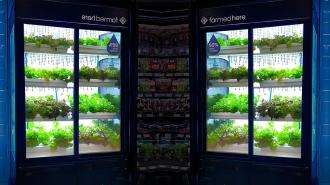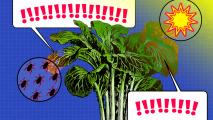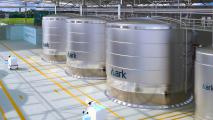An Egyptian company has built a hydroponic farm inside a grocery store — giving customers a chance to buy the very freshest produce while also combating climate change.
The challenge: Fresh produce is key to a healthy diet, but it also has a relatively short shelf life. As a result, you’ve probably trashed many a bag of lettuce because it went bad before you could use it. (Then that lettuce then went to a landfill where it rotted and produced the greenhouse gas methane.)
Even before it reached the grocery store, though, the lettuce was already contributing to climate change as the transportation of produce pumps more than 1 billion tons of carbon dioxide-equivalent emissions into the atmosphere every year.
“The consumer takes it fresh, and they can keep it fresh for another week to 10 days.”
Malik Muhammad Taj El-Din
The idea: By installing a lettuce-growing hydroponic farm inside a grocery store, Egypt’s Schaduf is not only eliminating the need to transport the produce from a farm, but also extending its freshness window for stores and customers, helping keep the veggie out of landfills.
“The consumer takes it fresh, and they can keep it fresh for another week to 10 days to use at home,” Malik Muhammad Taj El-Din, the company’s director of development, told Reuters.
Hydroponic farm: Trying to farm lettuce inside a grocery store using soil could get messy, but plants don’t need dirt to grow. They can also thrive in an indoor hydroponic system, which replaces soil with nutrient-fortified water and sunlight with LEDs.
This setup makes it easier to stack trays of plants vertically, too, meaning the grocery store doesn’t need to dedicate a lot of space to Schaduf’s hydroponic farm to grow a decent amount of produce in it.
“The fertilizers and the nutrients the plant needs are inside the water in a closed cycle.”
Malik Muhammad Taj El-Din
The system requires 90% less water than a traditional farm, too, according to Schaduf. That’s particularly important in Egypt, which is in the midst of a chronic water shortage.
“The fertilizers and the nutrients the plant needs are inside the water in a closed cycle, which means that there are tanks at the bottom of the fridge which pump water to feed all the plants in the refrigerator,” said Taj El-Din.
Schaduf hopes to install its hydroponic farms at other stores, and Moatasem Mostafa, the company’s operations manager, told Egyptian newspaper Al-Masry Al-Youmit that it might try growing strawberries and tomatoes in addition to lettuce.
A growing trend: Schaduf isn’t the only company bringing hydroponic farms to stores.
In June, Germany’s InFarm announced that it would be installing herb-growing setups at three IKEA locations, and several major US grocery chains are now using hydroponic farms built by California’s Advanced Container Technologies to grow produce in their parking lots.
The system requires 90% less water than a traditional farm.
It’s not clear whether customers are having to pay more for the extra-fresh produce, or whether the hydroponic setups cut costs for retailers — they’re spending less on transportation from farms, but they’re also now responsible for actually growing the plants.
Even if produce from an indoor hydroponic farm isn’t cheaper than the kind that grows in soil, the environmental benefits could make it appealing to those looking to reduce their carbon footprints and increase the amount of time they have before their lettuce goes bad.
We’d love to hear from you! If you have a comment about this article or if you have a tip for a future Freethink story, please email us at [email protected].






